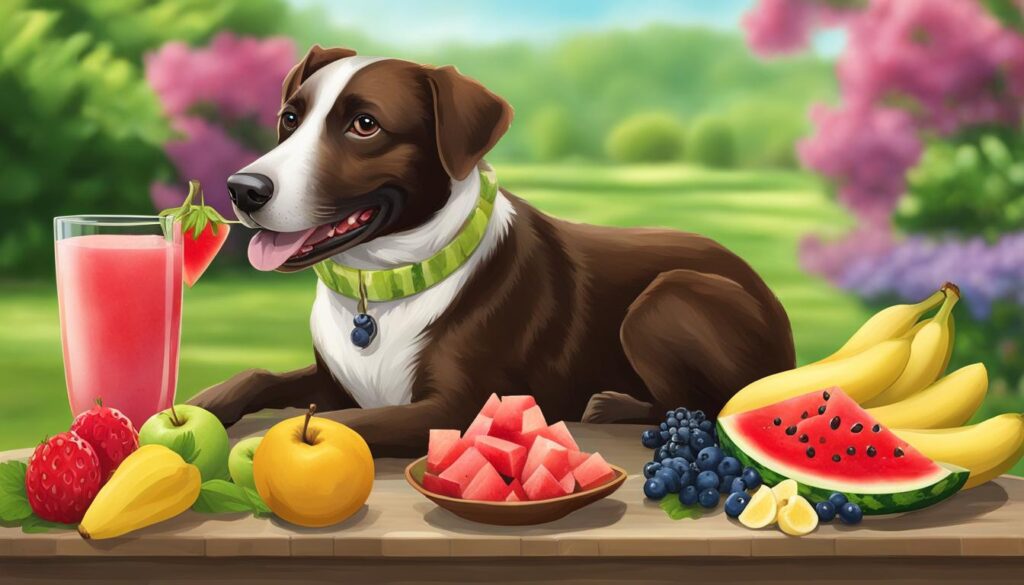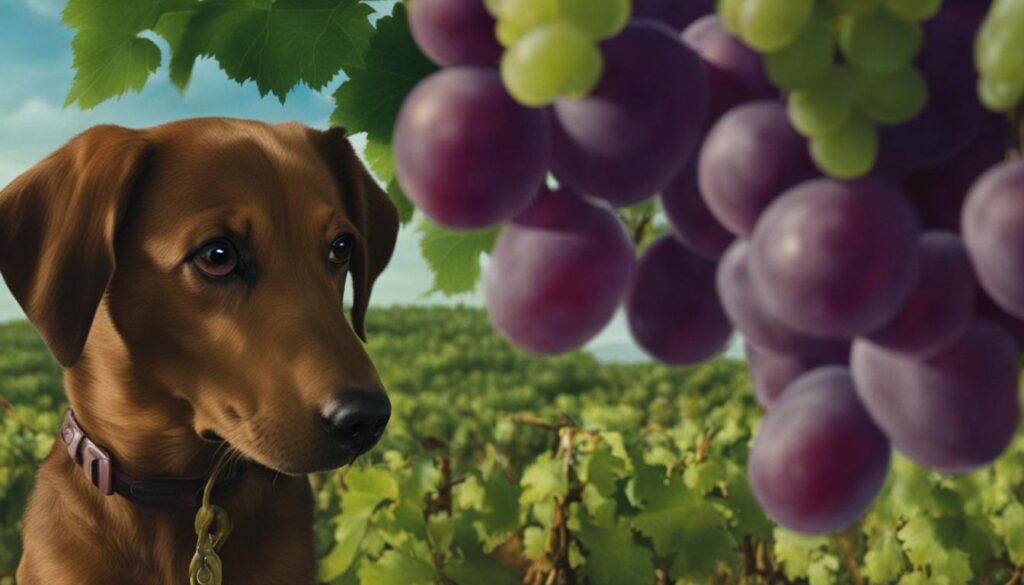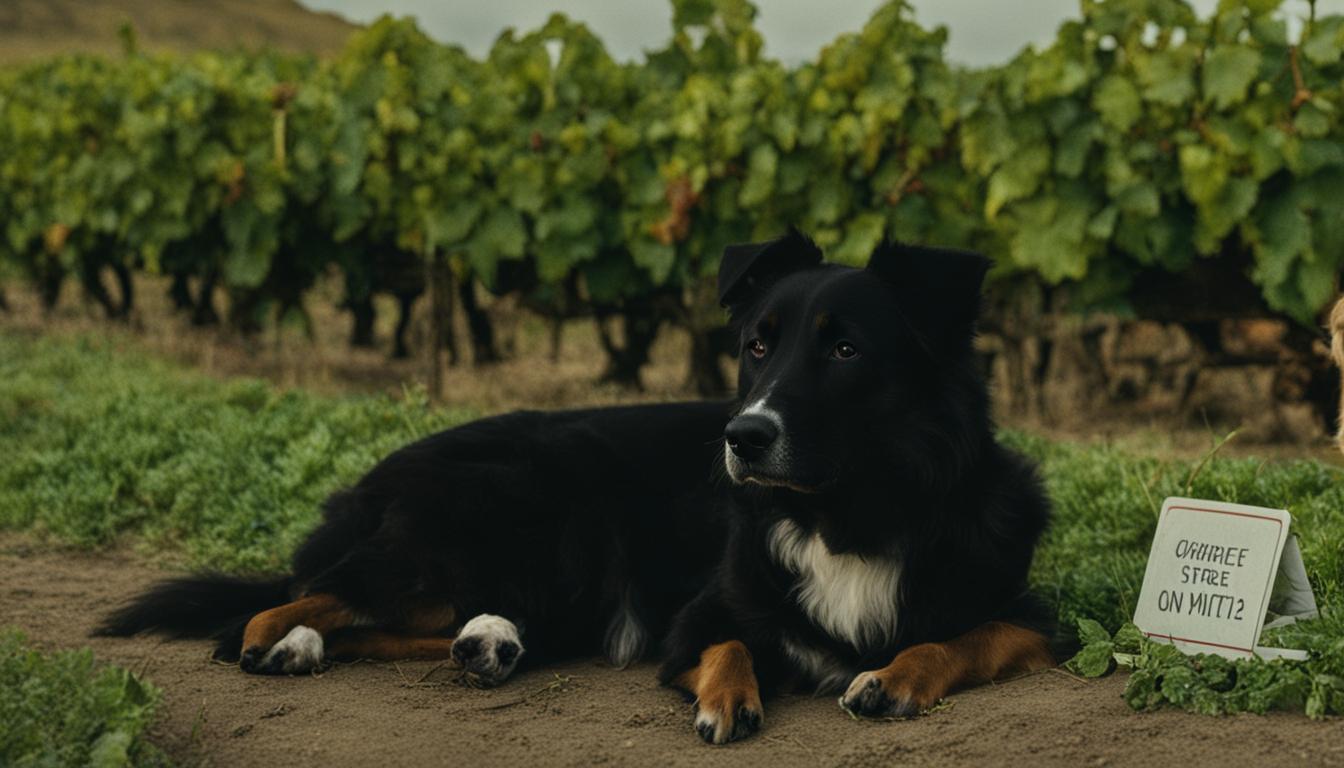Curious if it’s safe for your furry friend to snack on grapes? Well, the answer might surprise you. While grapes may be a delicious and healthy treat for humans, they pose a serious health risk to dogs. Grape toxicity in dogs can lead to kidney failure and even death. So, before you toss a grape their way, let’s dive into the details.
Key Takeaways:
- Grapes and raisins are highly toxic to dogs, causing kidney failure and potential death.
- There is no safe amount of grapes or raisins that dogs can consume.
- Even a small amount of grapes can be harmful to dogs, so it’s important to take immediate action if your dog ingests grapes.
- Symptoms of grape poisoning in dogs include vomiting, diarrhea, lethargy, and increased thirst.
- Avoid giving your dog any grape products, including raisins, juice, jelly, or jam.
Now that you know the risks, it’s crucial to keep grapes away from your furry companion. Stay tuned to learn more about grape toxicity in dogs and what to do if your dog accidentally eats grapes.
Grape Toxicity in Dogs: Exploring the Dangers
Grapes and raisins pose a serious health risk to dogs, as they can lead to kidney failure. The exact toxic substance in grapes is still unknown, but it is believed that dogs cannot metabolize certain compounds found in grapes, such as tannins and flavonoids. This inability to process these substances can result in severe toxicity and damage to the kidneys.
Dogs of any breed, age, or gender are susceptible to grape poisoning. Even a small amount of grapes can be harmful to dogs, and there is no safe threshold for consumption. It is essential to be vigilant and keep grapes out of your dog’s reach. This includes all forms of grapes, such as fresh grapes, raisins, grape juice, jelly, or jam.
The symptoms of grape poisoning in dogs can vary and may include vomiting, loss of appetite, diarrhea, lethargy, increased thirst, and decreased urine output. It is important to note that these symptoms may not appear immediately after ingestion and could be delayed. If you suspect your dog has consumed grapes or shows any signs of grape poisoning, it is crucial to seek immediate veterinary attention.
“Grapes and raisins are highly toxic to dogs. If your dog ingests grapes, early veterinary intervention is critical to prevent kidney failure and potentially save their life.”
Remember, prevention is key when it comes to grape toxicity in dogs. By being aware of the dangers and keeping grapes away from your furry friend, you can help ensure their safety and well-being.
| Symptoms of Grape Poisoning in Dogs |
|---|
| Vomiting |
| Loss of appetite |
| Diarrhea |
| Lethargy |
| Increased thirst |
| Decreased urine output |

What to Do If Your Dog Eats Grapes
If your dog ingests grapes or raisins, it is important to take immediate action. Since there is no established safe dose of grapes for dogs, even a small amount can be harmful. Contacting a veterinarian as soon as possible is crucial. The veterinarian may induce vomiting to remove the grapes from the dog’s system or recommend activated charcoal to minimize toxin absorption in the intestines. It is important to seek veterinary care even if the dog has only consumed a small amount of grapes, as symptoms of grape poisoning can be delayed and potentially fatal. Monitoring for symptoms such as increased blood pressure, nausea, and vomiting is essential.
In case of emergency, there are a few steps you can take before reaching out to a veterinarian. If your dog has just ingested grapes, you can try to induce vomiting by administering 3% hydrogen peroxide, following your veterinarian’s instructions. However, it is crucial to consult a veterinarian before attempting any home remedies, as the appropriate dosage and method of administration can vary depending on your dog’s size, breed, and overall health. It’s important to remember that inducing vomiting should only be done under the guidance of a veterinary professional.
While waiting for veterinary advice, you can also observe your dog for any signs of distress or discomfort. Look out for symptoms such as diarrhea, abdominal pain, excessive thirst, decreased appetite, and lethargy. Keep in mind that these symptoms may not be immediately apparent, so it is important to monitor your dog closely, even if they appear to be acting normal. Avoid giving your dog any food or water until you have received guidance from a veterinarian.
| Symptoms of Grape Poisoning in Dogs |
|---|
| Vomiting |
| Diarrhea |
| Abdominal pain |
| Excessive thirst |
| Decreased appetite |
| Lethargy |
Remember, time is of the essence when it comes to grape poisoning in dogs. Don’t hesitate to contact a veterinarian immediately, even if you suspect your dog may have ingested just a small amount of grapes or raisins. The prompt action is crucial to ensure the best possible outcome for your furry friend.
Grapes in Commercial Dog Food: What to Look Out For
If you’re a dog owner, it’s important to be aware of the potential dangers that grapes can pose to your furry friend. While it’s well-known that grapes themselves are toxic to dogs, it’s equally important to be mindful of the ingredients in your dog’s food. Grapes should never be included in commercial dog food, as they can lead to kidney failure and other serious health issues.
When purchasing commercial dog food, it’s crucial to read ingredient labels thoroughly. Look out for any mention of grapes or grape products, as well as raisins. Even a small amount of these ingredients can be harmful to your dog. It’s also worth noting that some protein bars and other food products marketed for dogs may contain raisins, which can also be toxic. It’s always better to be safe than sorry, so it’s best to avoid these products altogether.
If you prefer to make homemade food for your dog, you should exercise caution to ensure that no grapes or raisins inadvertently make their way into your dog’s meals. It’s easy to forget that grapes can be potentially harmful, so double-check your recipes and make sure to exclude these ingredients completely. Your dog’s health and well-being should always be a top priority.
| Signs of Grape Toxicity in Dogs | Signs of Grape Toxicity in Dogs |
|---|---|
| Vomiting | Loss of appetite |
| Diarrhea | Lethargy |
| Increased thirst | Decreased urine output |
If you suspect that your dog has consumed grapes or is showing any signs of grape toxicity, it’s important to seek immediate veterinary care. The symptoms may not be immediate, and delaying treatment can have serious consequences for your dog’s health. Remember, there is no known antidote for grape poisoning in dogs, so time is of the essence.
Alternatives to Grapes for Dogs: Safe Fruit Snacks
If you’re wondering what fruits you can safely give your dog as a snack, there are plenty of alternatives to grapes that are both delicious and safe for your furry friend. These fruits not only provide a tasty treat but also offer nutritional benefits that can support your dog’s overall health. Here are some safe fruit options for dogs:
- Bananas: Dogs can enjoy bananas in moderation. This fruit is an excellent source of potassium, vitamin C, and vitamin B6, which promote healthy digestion and immune system function.
- Apples (without seeds): Apples are a crunchy and refreshing snack for dogs. Be sure to remove the seeds and core before giving them to your pet, as these parts can be harmful. Apples are rich in fiber, antioxidants, and vitamin C.
- Blueberries: These tiny berries are packed with antioxidants, fiber, and essential vitamins. Blueberries are a great choice for dogs, as they can enhance brain function and support a strong immune system.
- Strawberries: Dogs can enjoy the sweet and tangy taste of strawberries. This fruit is high in fiber, vitamin C, and antioxidants, which can help improve your dog’s digestive health and promote healthy aging.
- Watermelon (without seeds or rind): Watermelon is a hydrating and refreshing snack for dogs, especially during hot summer months. Just make sure to remove the seeds and rind, as they can cause digestive issues. Watermelon is a good source of vitamins A and C.
Remember, moderation is key when giving fruits to your dog. While these fruits are safe for most dogs, some pets may have specific dietary restrictions or sensitivities. Always introduce new foods gradually and watch for any signs of digestive upset or allergic reactions. If you’re unsure about a particular fruit or have concerns about your dog’s diet, consult with your veterinarian for personalized guidance.
Table: Nutritional Benefits of Safe Fruits for Dogs
| Fruit | Nutritional Benefits |
|---|---|
| Bananas | High in potassium, vitamin C, and vitamin B6. Promotes healthy digestion and immune system function. |
| Apples (without seeds) | Rich in fiber, antioxidants, and vitamin C. Supports digestive health and provides dental benefits. |
| Blueberries | Packed with antioxidants, fiber, and essential vitamins. Enhances brain function and supports a strong immune system. |
| Strawberries | High in fiber, vitamin C, and antioxidants. Promotes healthy aging and supports digestive health. |
| Watermelon (without seeds or rind) | Hydrating and refreshing. Contains vitamins A and C. Helps maintain proper hydration levels in dogs. |
By offering these safe fruit alternatives to grapes, you can provide your dog with tasty and nutritious treats. Remember to always consider your dog’s individual dietary needs and consult with your veterinarian if you have any concerns. With the right choices, you can enhance your dog’s snacking experience while keeping them safe and healthy.

Grape Seed Extract and Dogs: Is It Safe?
Grape seed extract is a popular supplement known for its potential health benefits in humans. However, when it comes to our furry friends, the safety of grape seed extract for dogs remains a topic of debate. While grape seed extract may contain beneficial compounds such as antioxidants, there is also a potential risk of toxicity due to the presence of substances that are toxic to dogs, such as tannins and flavonoids.

At present, there is limited research available on the specific effects of grape seed extract on dogs. It is therefore recommended to exercise caution and avoid giving grape seed extract to dogs until further studies are conducted to determine its safety and appropriate dosage for canine consumption. It is always better to err on the side of caution and prioritize the well-being of our furry companions.
Alternatives to Grape Seed Extract
If you are looking for natural supplements for your dog, there are various alternative options available that have been deemed safe for canine consumption. Some common alternatives include fish oil, coconut oil, and turmeric. These supplements can provide health benefits for dogs without the potential risks associated with grape seed extract.
In conclusion, while grape seed extract may have potential health benefits for humans, its safety for dogs remains uncertain. It is advisable to seek advice from a veterinarian before introducing any new supplements into your dog’s diet. The well-being and health of our canine companions should always be our top priority.
Grapes and Puppy Health: Extra Precautions Needed
If you have a puppy, it’s important to be extra cautious when it comes to grape consumption. Puppies are more vulnerable to the toxic effects of grapes compared to adult dogs. Their smaller size and less developed organ systems make them more susceptible to grape poisoning. To ensure the health and safety of your puppy, you need to take extra precautions to prevent them from accessing grapes or raisins.
If you suspect that your puppy has ingested grapes or shows any symptoms of grape poisoning, immediate veterinary care should be sought. It’s crucial to act quickly as early intervention can lead to a better prognosis. Some common symptoms of grape poisoning in puppies may include vomiting, diarrhea, loss of appetite, lethargy, and increased thirst. If you notice any of these signs, do not hesitate to reach out to a veterinarian.
Prevention is key when it comes to protecting your puppy from grape toxicity. Make sure to keep grapes and all grape products out of your puppy’s reach. This includes foods like raisins, grape juice, jelly, or jam. It’s also important to be aware of potential sources of grapes in your puppy’s environment, such as fallen grapes in the backyard or grapes in the trash. By being vigilant and responsible, you can keep your puppy safe from the dangers of grape poisoning.
| Puppy Safety Tips |
|---|
| Keep grapes and grape products out of your puppy’s reach |
| Avoid feeding your puppy any foods that contain grapes or raisins |
| Be cautious of potential sources of grapes in your puppy’s environment |
| If you suspect grape poisoning, seek immediate veterinary care |
By following these precautions and staying informed about the dangers of grapes, you can ensure the well-being of your puppy. Remember, when it comes to your puppy’s health, it’s better to be safe than sorry. Stay proactive and attentive to keep your furry friend out of harm’s way.
Conclusion
In conclusion, it is crucial to understand the serious health risks that grapes and raisins pose to dogs. These seemingly harmless fruits can lead to kidney failure and even death in our furry friends. Avoid giving dogs any grape products, including raisins, juices, jelly, or jam, as there is no safe amount that they can consume.
If your dog happens to ingest grapes, immediate veterinary attention is necessary. Contact your veterinarian as soon as possible, as prompt intervention can help minimize the risks associated with grape toxicity. Remember, there is no known antidote for grape poisoning in dogs, so quick action is essential.
Prevention is the key to keeping our dogs safe. Ensure that grapes and all grape products are kept out of their reach, and be vigilant when reading ingredient labels to avoid accidental ingestion. Instead of grapes, there are plenty of safe fruit snacks that dogs can enjoy, such as bananas, apples, blueberries, strawberries, and watermelon.
By staying informed and taking responsible pet ownership seriously, we can protect our beloved dogs from the dangers of grape toxicity. Keep them safe, healthy, and happy by keeping grapes off their menu!
FAQ
Can dogs eat grapes?
No, grapes are highly toxic to dogs and can lead to kidney failure and death.
What are the symptoms of grape poisoning in dogs?
Symptoms may include vomiting, loss of appetite, diarrhea, lethargy, increased thirst, and decreased urine output.
Is there a safe amount of grapes that dogs can consume?
No, there is no safe amount of grapes for dogs to consume. Even a small amount can be harmful.
What should I do if my dog eats grapes?
Contact a veterinarian immediately for prompt veterinary care. The veterinarian may induce vomiting or recommend activated charcoal to minimize toxin absorption.
Can grapes be included in commercial dog food?
No, grapes should never be included in commercial dog food. It is important to read ingredient labels to ensure no grape or raisin products are present.
What are safe alternatives to grapes for dogs?
Safe fruit snacks for dogs include bananas, apples (without seeds), blueberries, strawberries, and watermelon (without seeds or rind).
Is grape seed extract safe for dogs?
There is limited research on the safety of grape seed extract for dogs. It is recommended to avoid giving it to dogs until further research is conducted.
Are puppies more vulnerable to grape toxicity?
Yes, puppies are more vulnerable due to their smaller size and less developed organ systems. Extra precautions should be taken to prevent access to grapes.





